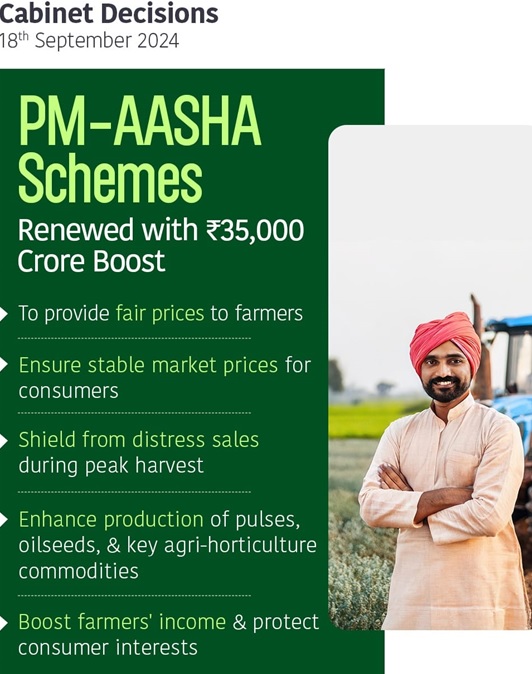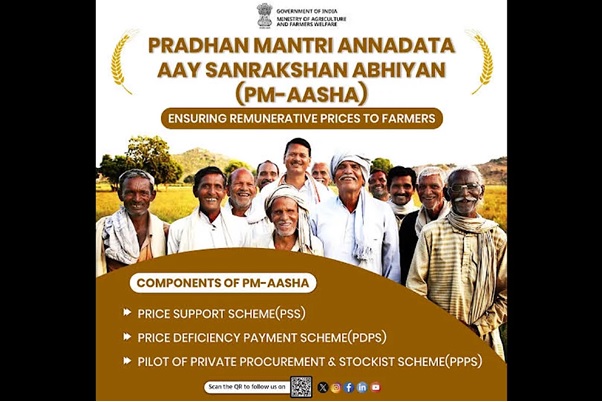Why is it in discussion?
- The central government has approved the continuation of the Prime Minister Annadata Income Protection Campaign (PM-AASHA) scheme until the year 2025-26.
- The government will procure 100% of the production of pigeon pea (tur), black gram (urad), and lentils (masoor) from states for the next four years.

Prime Minister Annadata Income Protection Campaign (PM-AASHA)

- Scheme Name: Prime Minister Annadata Income Protection Campaign
- Launched On: September 12, 2018
- Duration: 2018 to 2025-26
- Objective: Ensuring that farmers receive the benefits of the Minimum Support Price (MSP) for their produce.
- Nodal Ministry: Ministry of Agriculture & Farmers’ Welfare
- Implementation Areas: All states and union territories
- Official Website: agriwelfare.gov.in
Key Components of PM-AASHA Scheme
The PM-AASHA scheme is divided into three major components:

1. Price Support Scheme (PSS)
- This scheme is implemented through state governments and central agencies.
- Under this scheme, agencies like NAFED, FCI, and CCI procure crops such as oilseeds, pulses, and cotton.
- If market prices fall below MSP, the government purchases these crops at MSP to protect farmers.
2. Price Deficiency Payment Scheme (PDPS)
- This scheme is based on Madhya Pradesh’s "Bhavantar Bhugtan Yojana".
- If the market price of a crop falls below MSP, the government directly compensates farmers for the difference in their bank accounts.
- This scheme mainly focuses on oilseeds (mustard, soybean, etc.).
- Farmers have the freedom to sell their produce in the open market while still receiving MSP benefits.
3. Private Procurement and Stockist Scheme (PPSS)
- Implemented on a pilot basis in selected states.
- Under this, private companies and traders are authorized to procure crops at MSP from farmers.
- The government provides partial financial assistance to these private entities.
- This scheme primarily applies to oilseeds.
Features & Benefits of PM-AASHA Scheme
- Guaranteed MSP: Farmers are assured of a fair price for their crops.
- Direct Government Procurement: Protects farmers' income by purchasing crops directly from them.
- Price Compensation: If market prices drop, the government pays the difference to farmers.
- Market Stability: Shields farmers from price fluctuations.
- Boosts Oilseed & Pulse Production: Helps India achieve self-sufficiency in food security.
Eligibility for PM-AASHA Scheme
- All farmers in India are eligible.
- Farmers must sell their crops in the market, and if they receive a price lower than MSP, the government compensates the difference.
- Farmers must be registered under PM-KISAN and other government schemes to receive direct bank payments.
Crops Covered Under PM-AASHA Scheme
- Pulse Crops: moong, urad, tur, masoor, chana, and matar.
- Oilseeds: Mustard, soybean, sunflower, groundnut, sesame.
- Copra (dried coconut kernel)
- Cotton (covered under Price Support Scheme)
Significance of PM-AASHA Scheme
- Acts as a safety net for farmers, ensuring MSP benefits and stable income.
- Farmers can sell their produce without risk, as the government compensates them if they receive lower prices.
- Strengthens the agricultural sector in India.
- Plays a key role in the goal of doubling farmers’ income.




